Unit 2 What time do you go to school? Section B 1a-1e听说课B(共34张PPT)
文档属性
| 名称 | Unit 2 What time do you go to school? Section B 1a-1e听说课B(共34张PPT) |  | |
| 格式 | pptx | ||
| 文件大小 | 37.9MB | ||
| 资源类型 | 教案 | ||
| 版本资源 | 人教新目标(Go for it)版 | ||
| 科目 | 英语 | ||
| 更新时间 | 2022-06-09 11:03:35 | ||
图片预览

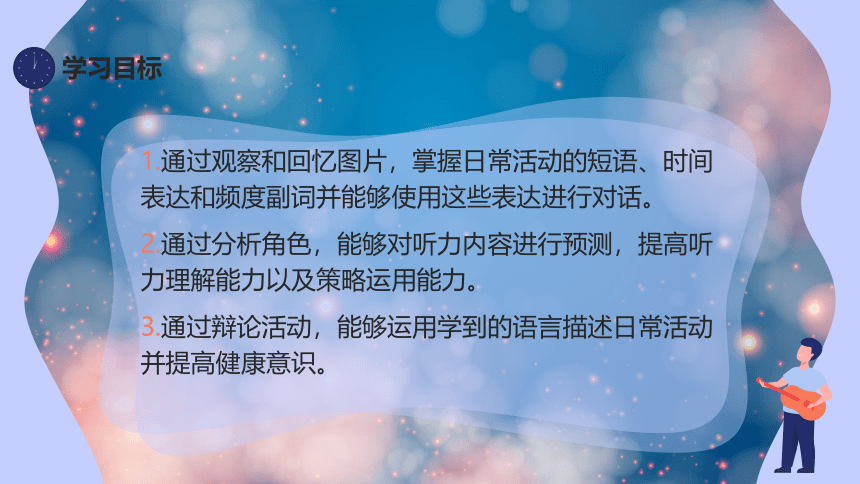


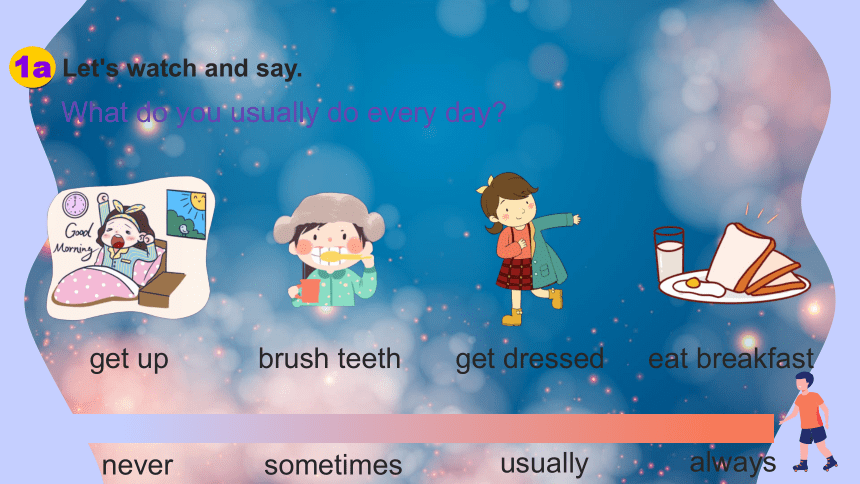
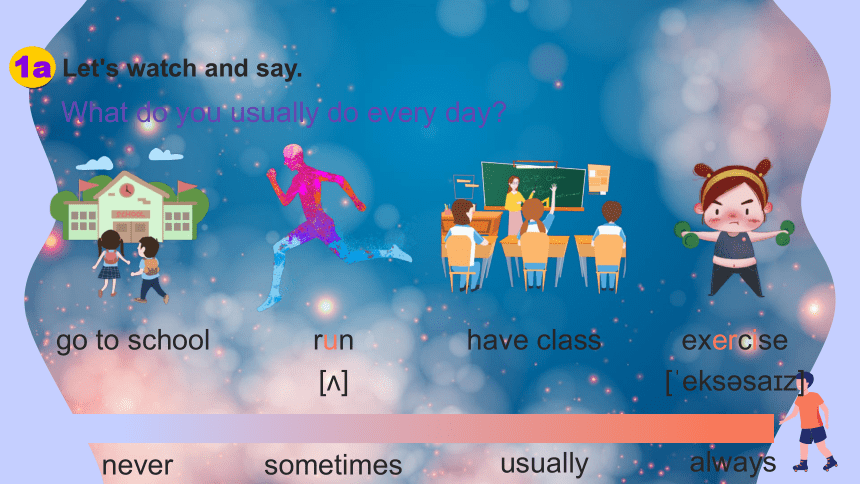
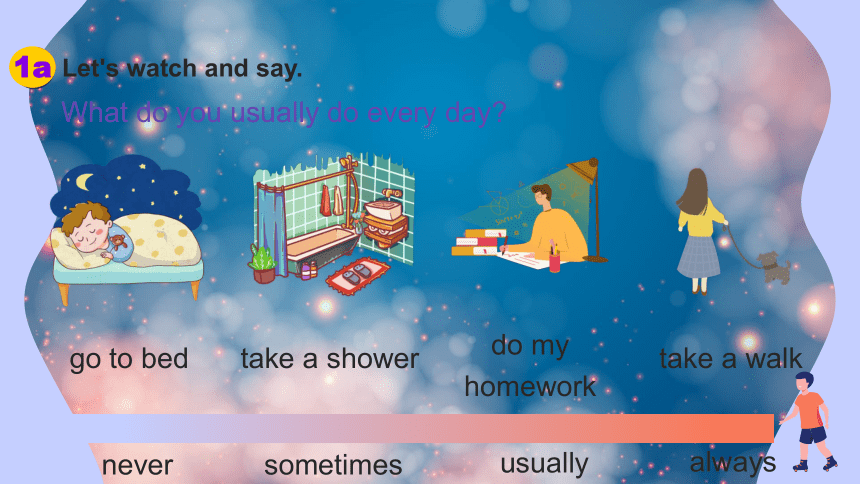
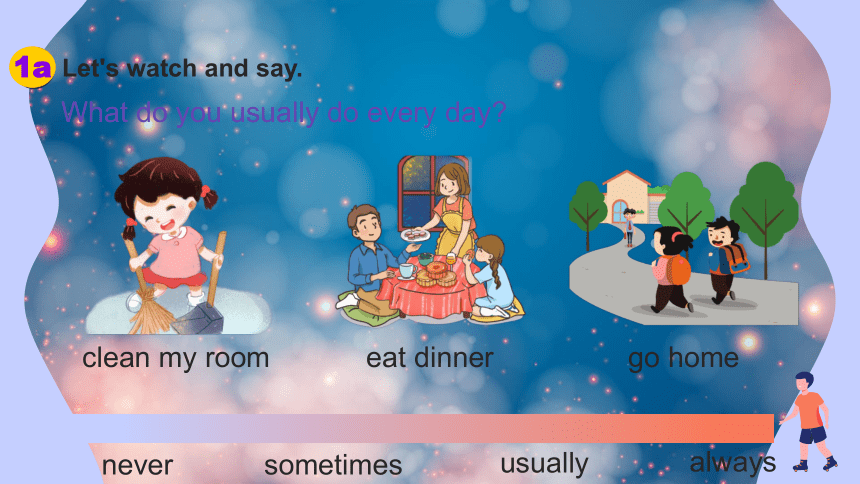
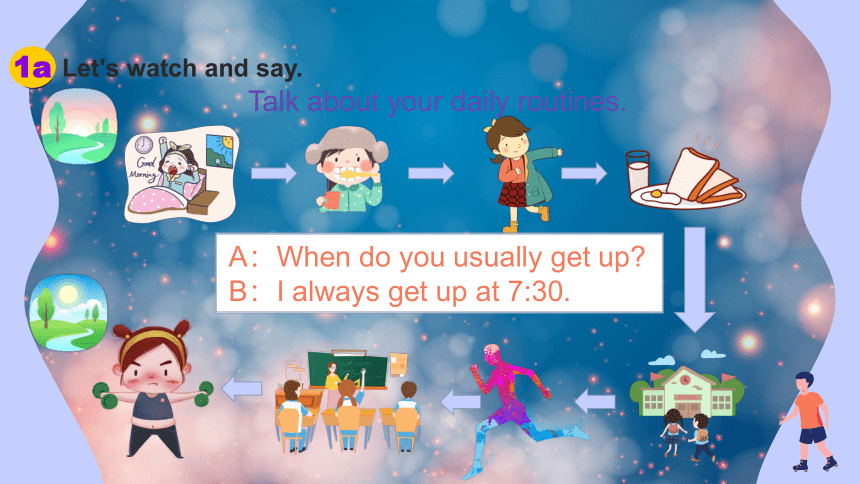
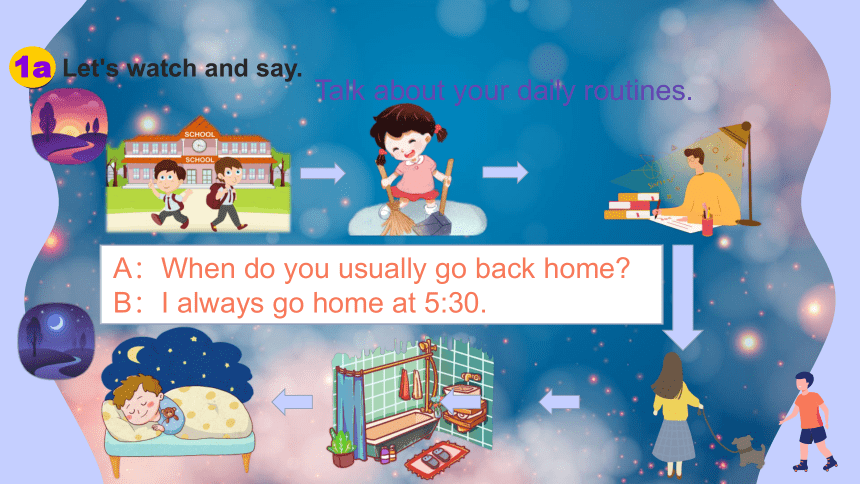

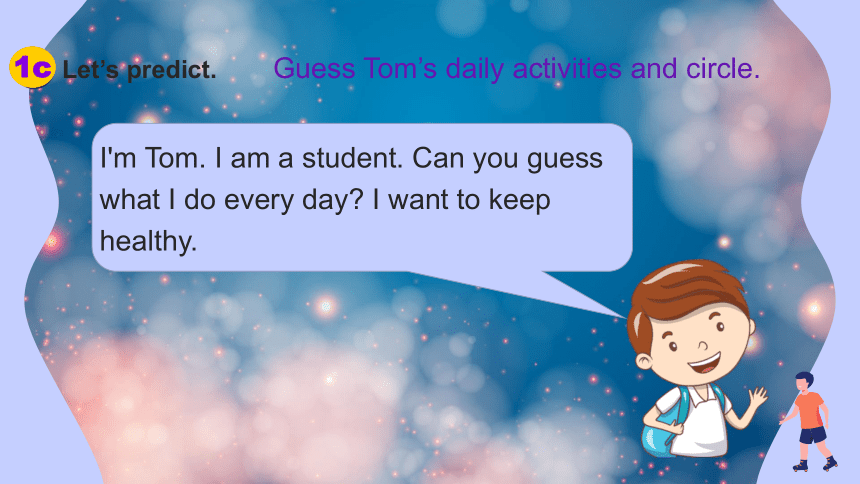
文档简介
(共34张PPT)
What time do you go to school
初中英语人教版 七年级下
Section B 1a-1e
Unit 2 听说课
学习目标
1.通过观察和回忆图片,掌握日常活动的短语、时间表达和频度副词并能够使用这些表达进行对话。
2.通过分析角色,能够对听力内容进行预测,提高听力理解能力以及策略运用能力。
3.通过辩论活动,能够运用学到的语言描述日常活动并提高健康意识。
词汇导入
part 1
Let's watch and say.
1a
6:00 A.M.
6:10 A.M.
6:30 A.M.
3:15 P.M.
6:45 P.M.
9:45 P.M.
9:55 P.M.
Let's watch and say.
brush teeth
get dressed
get up
eat breakfast
1a
What do you usually do every day
always
usually
sometimes
never
Let's watch and say.
run
[ ]
have class
go to school
exercise
[ eks sa z]
1a
always
usually
sometimes
never
What do you usually do every day
Let's watch and say.
take a shower
do my homework
go to bed
take a walk
1a
What do you usually do every day
always
usually
sometimes
never
Let's watch and say.
clean my room
eat dinner
go home
1a
What do you usually do every day
always
usually
sometimes
never
Let's watch and say.
1a
Talk about your daily routines.
A:When do you usually get up
B:I always get up at 7:30.
Let's watch and say.
1a
A:When do you usually go back home
B:I always go home at 5:30.
Talk about your daily routines.
听说活动
part 2
Let’s predict. Guess Tom’s daily activities and circle.
1c
I'm Tom. I am a student. Can you guess what I do every day I want to keep healthy.
Let’s predict. Guess Tom’s daily activities and circle.
1. get up
2. run
3. eat breakfast
4. go to school
5. go home
1c
6. do my homework
7. clean my room
8. eat dinner
9. take a walk
10. go to bed
听力策略:根据个人经验熟悉题目并进行听前预测
Listening.
1. get up
2. run
3. eat breakfast
4. go to school
5. go home
1c
Listen and circle the activities you hear.
6. do my homework
7. clean my room
8. eat dinner
9. take a walk
10. go to bed
Listening.
1. get up _____
2. run _____
3. eat breakfast _____
4. go to school _____
5. go home _____
1d
Listen again. Write the time next to the activities you circled in 1c.
6. do my homework _____
7. clean my room _____
8. eat dinner _____
9. take a walk _____
10. go to bed _____
5:30
6:00
7:00
7:45
16:15
17:30
19:15
21:00
Let’s talk.
6:00
7:00
5:30
7:45
A: When does Tom usually get up
B: He always gets up at half past five.
always
usually
sometimes
never
Let’s talk.
5:30
7:15
4:15
9:00
A: When does Tom usually get up
B: He always gets up at half past five.
always
usually
sometimes
never
Let’s create and debate.
Tom is healthy enough.
VS.
Tom is not healthy enough.
Let’s debate.
I think he is healthy because he gets up at 5:30 and exercises in the morning.
I think he is not healthy enough. He could take a walk after dinner.
总结回顾
part 3
Let’s self-check.
学习目标 1 2 3 4 5
能掌握日常活动的短语,时间表达和频度副词并能够使用这些表达进行对话
能分析角色,对听力内容进行预测
能运用学到的语言描述日常活动以及进行辩论
词汇大礼包
part 4
Let’s learn and take notes.
run /v./
1. I enjoy sports and I can run really fast.
2. The river runs very slowly.
3. The clock runs all day and all night.
4. My uncle runs a shop.
经营
跑
运转
流动
run after追赶
run out 用尽
runner 跑步的人
running water 自来水
Let’s learn and take notes.
If you want to be a good athlete, you must
practice _______ every day. (run)
1.
running
Let’s learn and take notes.
— We must act out because time is _______ .
— Yes, let’s start.
1
come out
cutting out
giving out
running out
Let’s practice.
1. 洗澡
2. 去上班
3. 穿上
4. 散步
5. 做作业
1. take a shower
2. go to work
3. put on
4. take a walk
5. do homework
Let’s practice.
6. 上学
7. 上床睡觉
8. 到达
9. 起床
10. 锻炼
6. go to school
7. go to bed
8. get to
9. get up
10. exercise/take exercise
Let’s practice.
I usually ______ in the morning after I get up.
1.
Betty usually has breakfast at a ______ past seven.
2.
exercise
quarter
quarter, homework, exercise, quick
选择合适的单词,并用其适当形式填空。
Let’s practice. 选择合适的单词,并用其适当形式填空。
It’s seven fifty now. Let’s go to school ______.
3.
I’m happy because I have no ______ today.
4.
quickly
homework
quarter, homework, exercise, quick
Let’s practice.
— 汤姆通常什么时候起床?
— 他通常六点起床。
1.
— When does Tom usually get up
— He usually gets up at six o’clock.
Let’s practice.
— 人们通常什么时候吃晚餐?
— 人们通常在傍晚吃晚餐。
2.
— When do people usually eat dinner
— People usually eat dinner in the evening.
Let’s practice.
我想在晚餐后散散步。
3.
I want to take a walk after dinner.
Let’s practice.
他通常在傍晚七点做家庭作业。
4.
He usually does his homework at seven o’clock in the
evening.
Homework.
1. Make a healthier schedule for Tom.
2. Talk about Tom's new schedule and record it.
3. Think: Your healthy habits and unhealthy habits.
What time do you go to school
初中英语人教版 七年级下
Section B 1a-1e
Unit 2 听说课
学习目标
1.通过观察和回忆图片,掌握日常活动的短语、时间表达和频度副词并能够使用这些表达进行对话。
2.通过分析角色,能够对听力内容进行预测,提高听力理解能力以及策略运用能力。
3.通过辩论活动,能够运用学到的语言描述日常活动并提高健康意识。
词汇导入
part 1
Let's watch and say.
1a
6:00 A.M.
6:10 A.M.
6:30 A.M.
3:15 P.M.
6:45 P.M.
9:45 P.M.
9:55 P.M.
Let's watch and say.
brush teeth
get dressed
get up
eat breakfast
1a
What do you usually do every day
always
usually
sometimes
never
Let's watch and say.
run
[ ]
have class
go to school
exercise
[ eks sa z]
1a
always
usually
sometimes
never
What do you usually do every day
Let's watch and say.
take a shower
do my homework
go to bed
take a walk
1a
What do you usually do every day
always
usually
sometimes
never
Let's watch and say.
clean my room
eat dinner
go home
1a
What do you usually do every day
always
usually
sometimes
never
Let's watch and say.
1a
Talk about your daily routines.
A:When do you usually get up
B:I always get up at 7:30.
Let's watch and say.
1a
A:When do you usually go back home
B:I always go home at 5:30.
Talk about your daily routines.
听说活动
part 2
Let’s predict. Guess Tom’s daily activities and circle.
1c
I'm Tom. I am a student. Can you guess what I do every day I want to keep healthy.
Let’s predict. Guess Tom’s daily activities and circle.
1. get up
2. run
3. eat breakfast
4. go to school
5. go home
1c
6. do my homework
7. clean my room
8. eat dinner
9. take a walk
10. go to bed
听力策略:根据个人经验熟悉题目并进行听前预测
Listening.
1. get up
2. run
3. eat breakfast
4. go to school
5. go home
1c
Listen and circle the activities you hear.
6. do my homework
7. clean my room
8. eat dinner
9. take a walk
10. go to bed
Listening.
1. get up _____
2. run _____
3. eat breakfast _____
4. go to school _____
5. go home _____
1d
Listen again. Write the time next to the activities you circled in 1c.
6. do my homework _____
7. clean my room _____
8. eat dinner _____
9. take a walk _____
10. go to bed _____
5:30
6:00
7:00
7:45
16:15
17:30
19:15
21:00
Let’s talk.
6:00
7:00
5:30
7:45
A: When does Tom usually get up
B: He always gets up at half past five.
always
usually
sometimes
never
Let’s talk.
5:30
7:15
4:15
9:00
A: When does Tom usually get up
B: He always gets up at half past five.
always
usually
sometimes
never
Let’s create and debate.
Tom is healthy enough.
VS.
Tom is not healthy enough.
Let’s debate.
I think he is healthy because he gets up at 5:30 and exercises in the morning.
I think he is not healthy enough. He could take a walk after dinner.
总结回顾
part 3
Let’s self-check.
学习目标 1 2 3 4 5
能掌握日常活动的短语,时间表达和频度副词并能够使用这些表达进行对话
能分析角色,对听力内容进行预测
能运用学到的语言描述日常活动以及进行辩论
词汇大礼包
part 4
Let’s learn and take notes.
run /v./
1. I enjoy sports and I can run really fast.
2. The river runs very slowly.
3. The clock runs all day and all night.
4. My uncle runs a shop.
经营
跑
运转
流动
run after追赶
run out 用尽
runner 跑步的人
running water 自来水
Let’s learn and take notes.
If you want to be a good athlete, you must
practice _______ every day. (run)
1.
running
Let’s learn and take notes.
— We must act out because time is _______ .
— Yes, let’s start.
1
come out
cutting out
giving out
running out
Let’s practice.
1. 洗澡
2. 去上班
3. 穿上
4. 散步
5. 做作业
1. take a shower
2. go to work
3. put on
4. take a walk
5. do homework
Let’s practice.
6. 上学
7. 上床睡觉
8. 到达
9. 起床
10. 锻炼
6. go to school
7. go to bed
8. get to
9. get up
10. exercise/take exercise
Let’s practice.
I usually ______ in the morning after I get up.
1.
Betty usually has breakfast at a ______ past seven.
2.
exercise
quarter
quarter, homework, exercise, quick
选择合适的单词,并用其适当形式填空。
Let’s practice. 选择合适的单词,并用其适当形式填空。
It’s seven fifty now. Let’s go to school ______.
3.
I’m happy because I have no ______ today.
4.
quickly
homework
quarter, homework, exercise, quick
Let’s practice.
— 汤姆通常什么时候起床?
— 他通常六点起床。
1.
— When does Tom usually get up
— He usually gets up at six o’clock.
Let’s practice.
— 人们通常什么时候吃晚餐?
— 人们通常在傍晚吃晚餐。
2.
— When do people usually eat dinner
— People usually eat dinner in the evening.
Let’s practice.
我想在晚餐后散散步。
3.
I want to take a walk after dinner.
Let’s practice.
他通常在傍晚七点做家庭作业。
4.
He usually does his homework at seven o’clock in the
evening.
Homework.
1. Make a healthier schedule for Tom.
2. Talk about Tom's new schedule and record it.
3. Think: Your healthy habits and unhealthy habits.
同课章节目录
- Unit 1 Can you play the guitar?
- Section A
- Section B
- Unit 2 What time do you go to school?
- Section A
- Section B
- Unit 3 How do you get to school?
- Section A
- Section B
- Unit 4 Don't eat in class.
- Section A
- Section B
- Unit 5 Why do you like pandas?
- Section A
- Section B
- Unit 6 I'm watching TV.
- Section A
- Section B
- Review of Units 1-6
- Unit 7 It's raining!
- Section A
- Section B
- Unit 8 Is there a post office near here?
- Section A
- Section B
- Unit 9 What does he look like?
- Section A
- Section B
- Unit 10 I'd like some noodles.
- Section A
- Section B
- Unit 11 How was your school trip?
- Section A
- Section B
- Unit 12 What did you do last weekend?
- Section A
- Section B
